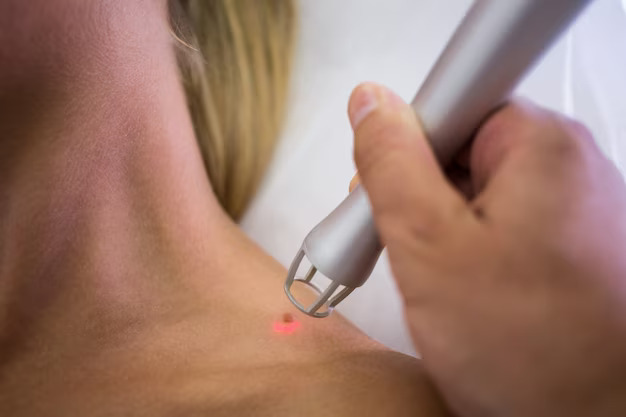Skin Tag (Acrochordon) Removal
Skin tags are common, benign growths that appear as small, soft balloons hanging on a narrow stalk. They are harmless and can vary in number, ranging from a few to numerous.
Skin tags are equally likely to affect men and women, with obesity being associated with their development. While some skin tags may fall off on their own, most persist once formed. Medically referred to as acrochordon, skin tags are sometimes colloquially called “skin tabs.” Initially, they may be as small as a flattened pinhead, but they can grow to the size of a large grape or fig.

Symptoms
Skin tags generally do not cause physical pain, and their removal is often sought for cosmetic reasons. However, there are instances where removal may be necessary due to specific symptoms or changes in the skin tag. Reasons for skin tag removal may include:
- Inflammation: Skin tags can become irritated, appearing red or bleeding, which may warrant removal.
- Twisting: If a skin tag twists, it may become black, indicating a potential issue, and removal may be necessary.
- Necrosis: Skin tags may undergo necrosis, resulting in the death of the skin tissue, which could be a reason for removal.
While these symptoms may indicate a need for removal, it’s important to consult with a healthcare professional to assess the specific situation and determine the most appropriate course of action.
Cause
The exact cause of skin tags is not entirely clear, but researchers believe that they may develop with age, often due to friction between skin folds. Common observations include:
Age and Friction: Skin tags are more frequently seen in older individuals, possibly as a result of increased friction between skin folds.
Obesity and Diabetes: Skin tags are commonly observed in older, obese individuals, as well as those with diabetes.
Pregnancy: Hormonal changes during pregnancy, particularly fluctuations in estrogen and progesterone levels, may contribute to the development of skin tags in most pregnant women.
Hereditary Predisposition: Some studies suggest a genetic predisposition to the development of skin tags, indicating that a family history may play a role.
While these factors are associated with the occurrence of skin tags, individual cases may vary, and the exact mechanism of their formation is not fully understood.
Determinants of risk
The removal of skin tags (acrochordon) is generally a safe and straightforward procedure. However, certain factors may influence the risk associated with the removal process. Determinants of risk in skin tag removal include:
Location: Skin tags in sensitive or delicate areas, such as the eyelids or genital area, may pose a higher risk during removal.
Size: Larger skin tags may present a greater challenge during removal and could be associated with increased bleeding or scarring.
Underlying Health Conditions: Individuals with certain health conditions, such as bleeding disorders, may face a higher risk during the removal procedure.
DIY Removal: Attempting to remove skin tags at home, without professional guidance, can increase the risk of infection, scarring, or other complications.
Improper Technique: The use of inappropriate or unsterile instruments, as well as improper techniques during removal, can elevate the risk of complications.
It is advisable to consult with a healthcare professional or dermatologist for the safe and effective removal of skin tags, especially if there are concerns about potential risks or complications.
Recovery process
Recovery duration varies, contingent on factors like patient characteristics, chosen procedure, and the extent of severity.
Why entrust your care to us?
At Steps 2 Cure, our foundation of trust is built upon several key pillars that ensure your confidence in our services and expertise. Our team comprises highly qualified professionals with extensive experience in their respective fields. Their knowledge and skills enable us to offer you the best possible care and solutions for your medical needs. We understand that each individual is unique, and so are their healthcare requirements.
That’s why we prioritize tailoring our treatments and approaches to your specific circumstances, ensuring that you receive care that is truly designed for you. You are at the heart of everything we do. Your comfort, concerns, and aspirations guide our efforts. Our compassionate approach ensures that you feel valued and supported throughout your healthcare experience.
To commence the treatment procedure, you can start by forwarding your questions via WhatsApp at (+91 9999652964) or by sending an email to care@steps2cure.com. Our team will ensure a swift response to your queries.
Still have a Query?
Your health and peace of mind matter to us, and we’re dedicated to addressing any inquiries you may have with care and expertise. Feel free to reach out.
Subscribe To Our Newsletter
Stay in touch with us to get latest news and special offers.

